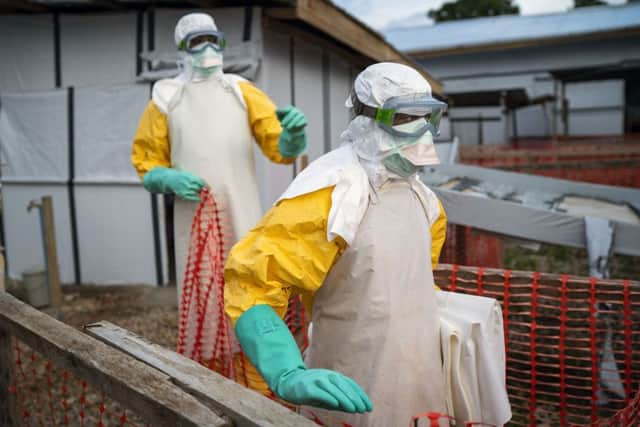Ebola virus could spread around the world, warns Scots doctor working in Africa


Dr Emma Thomson is leading a Scots team working with experts in neighbouring Uganda to try to prevent the virus spreading around the world. She has just returned from an assignment that saw her working with domestic scientists to monitor and contain the lethal virus, as well as detecting other diseases before they cost thousands of lives. Her work on the Ugandan border with the DRC saw her team test patients suspected of having diseases caused by Ebola and other viruses.
Viral haemorrhagic fevers such as Ebola are lethal because they leave patients severely dehydrated before their organs eventually fail.
Advertisement
Hide AdAdvertisement
Hide AdThe crisis in the DRC is the second biggest Ebola outbreak in history and has claimed the lives of more than 1,600 people in a year.
Dr Thomson, the clinical senior lecturer at the University of Glasgow’s Centre for Virus Research, said: “I firmly believe that, if we do not track and stop viruses like Ebola at source, there is a risk that they will travel to the UK.
“Besides that, we have a duty of care to people living in other countries with fewer resources who are under constant threat from dangerous viruses.”
Dr Thomson was based at a clinic in the border town of Arua, less than a mile from the DRC.
She said: “I was with doctors and scientists from the Uganda Virus Research Institute in a field lab with fairly basic facilities and then in a very sophisticated laboratory with state-of-the-art equipment in Entebbe, in the south of Uganda.
“They have one of the best viral institutions in Africa and the Ugandan scientists will soon be able to use the methods that we use in the UK to detect viruses.”
Her team worked in an old plague lab. “We repurposed that and screened for viruses using new sequencing methods,” she said.
“Gowns, gloves and facial shields were always worn if we suspected a patient had a hemorrhagic fever.”
Advertisement
Hide AdAdvertisement
Hide AdUsing handheld devices called sequencers, the scientists can spot signs of a virus in a patient’s bloodstream. They are also able to detect antibodies which could fight other infections the victims have been exposed to.
Given the ease with which people can travel around the world, Dr Thomson said she believed the risk of such Ebola and other lethal viruses spreading was ever-present.
“As a junior doctor I was always taught that Ebola and other hemorrhagic viruses would always be contained to remote areas affecting only small numbers of people, but that turned out to be wrong,” she said. “Few believed that people in remote areas of Africa would travel and take it with them. Roads and transport have made travel routine.
“It only takes someone to get on a plane to Europe and bring it into larger cities to put huge numbers of people at risk ... including the UK.
“Aside from Ebola, we have had a patient with Crimean-Congo hemorrhagic fever in Glasgow and Lassa fever has also been detected in UK patients.” Dr Thomson was part of the team who treated 43-year-old Pauline Cafferkey, the Fife nurse who in 2014 contracted Ebola while working in Sierra Leone.